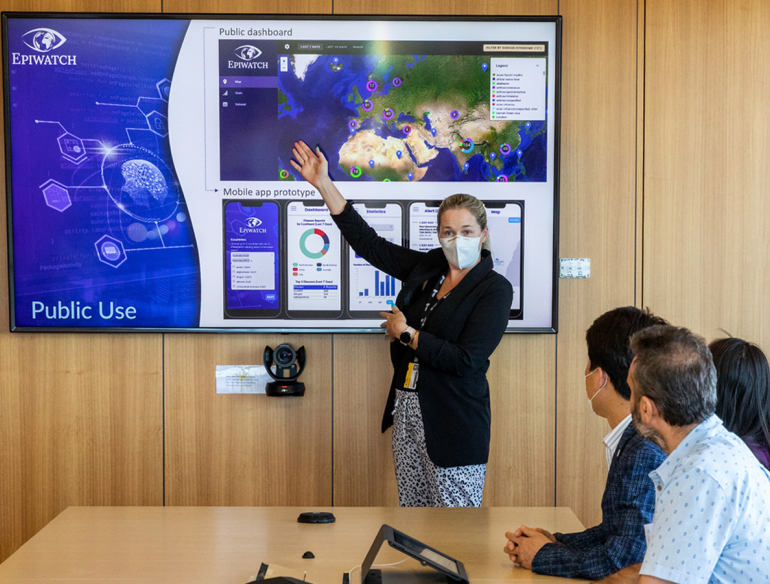(CANBERRA, 11 September 2023) A new Hindi language application and dashboard designed for the Kirby Institute at UNSW Sydney’s epidemic observatory EPIWATCH will facilitate expanded access to pandemic early warnings.
The dashboard was launched yesterday in Canberra by Ruchicka Jain, first secretary of Indian High Commission, along with Dr. Michelle Ananda Rajah, infectious diseases physician and Member of Parliament and Dr Andrew Charlton, MP, the Chair of Parliamentary Friends of India. It will allow health and government workers in India who may not read or speak English to use EPIWATCH at the grass roots level to monitor for potential epidemic threats.
“EPIWATCH is an excellent example of collaboration between India and Australia, through identifying infectious disease of outbreak potential. It is my great pleasure to launch the Hindi version of EPIWATCH, and I welcome greater cooperation between our two countries, in in the prevention and control of infectious diseases,” said His Excellency Mr. Manpreet Vohra, the High Commissioner of India to Australia.
EPIWATCH, was developed by Professor Raina MacIntyre, head of the Biosecurity Program at the Kirby Institute in 2016. It is an artificial intelligence (AI) early warning system for serious emerging epidemics. The tool works by applying AI millions of items of publicly available online data, such as websites and news reports, for early signals of epidemics. It processes vast amounts of data in real time, using AI to filter specific disease signals. EPIWATCH has demonstrated excellent capacity to detect serious epidemics faster than current systems.
Major gift facilitates wider access
In 2022, Ethereum co-founder Vitalik Buterin gifted $4 million USDC from his Balvi Filantropic fund to this work to establish the Shiba Inu OSINT EPIWATCH. At the time it was the largest known cryptocurrency donation to an Australian higher education institution. The Shiba Inu OSINT EPIWATCH initiative is primarily focused on enabling access to the platform in low- and middle-income countries, helping to prevent future global pandemics.
This year, a further $2 million USDC was gifted by Buterin to support the development of EPIWATCH dashboards in Indian languages, to assist with epidemic responses the world’s most populous countries.
“The generous gift from Balvi Filantropic Fund enabled important development work on the EPIWATCH system,” says Prof. MacIntyre from the Kirby Institute. “This included advanced AI research, and establishing collaborations with key stakeholders, particularly in India.”
EPIWATCH searches in 52 languages including 12 Indian languages, but the user interface is in English, and the system translates the epidemic intelligence collected from around the world into English. The additional funds will enable user dashboards in other languages, so that all the intelligence received by EPIWATCH can be provided to users in languages beyond English, starting with Hindi, an official language of the most populous country in the world.
This launch coincided with the SAFETYNET/TEPHINET conference, at which UNSW ran a pre-conference workshop on AI for Epidemic Surveillance and Early Warnings. Attendees from around the world, including from the Indian Field Epidemiology training program attended the conference and the workshop.

